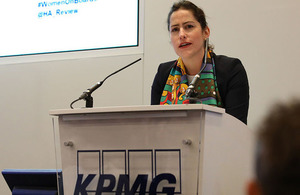Sexual harassment victims to "have their say" on laws designed to protect them
The Government Equalities Office is today calling for sexual harassment victims to share their stories, in one of the largest surveys of its kind ever to be carried out.

Feeding into plans to strengthen protections for employees across the UK from sexual harassment, the survey will allow the public to have an impact on Government policy, and ensure those policies are targeted in the right places.
The survey - which will go out to 12,200 people from every walk of life - will build a picture of how many people are affected, askng people about their experiences of sexual harassment inside and outside the workplace; where they experience harassment; and what forms of harassment they have experienced.
ComRes, in their 2017 research for the BBC, claim that 40% of women (and 18% of men) have experienced unwanted sexual behaviour at work at some point.
Minister for Women, Victoria Atkins, said:
“Sexual harassment is wrong and survivors must be able to share their stories. This survey will help us build a clear picture of who is affected and where. Working together with business, we can stamp it out.”
The survey is part of a package of commitments to tackle sexual harassment at work, including a new statutory Code of Practice so employers better understand their legal responsibilities, and a consultation on new plans to tackle harassment at work - including giving explicit legal protections to workers, such as waiters and shop assistants, against harassment from customers.
The Equality and Human Rights Commission has this week published a draft version of the Code of Practice, advising employers on how to make their workplace safe from sexual harassment.
The initial consultation, which ended in October, asked for views on:
- strengthening and clarifying the law to give explicit protections against third party harassment in the Equality Act 2010
- how best to ensure that employers take all steps they can to prevent harassment from happening, including considering if a new legal duty is needed
- the evidence for extending Equality Act 2010 workplace protections to volunteers and interns;
- whether the three-month time limit for employment tribunal claims under the Equality Act 2010 should be extended.
Nearly 5000 people responded to the consultation which the government will respond to, setting out the next steps, this spring.
Notes to editors:
The survey will go out to people in England, Scotland, Wales and Northern Ireland.
The government promised to:
- Introduce a new statutory code of practice on sexual harassment, which will be developed by the Equality and Human Rights Commission under its Equality Act 2006 powers
- Work with Advisory Conciliation and Arbitration Service (Acas), Equality and Human Rights Committee (EHRC) and employers to raise awareness.
- Commission a survey to gather regular data on the prevalence of sexual harassment
- Consult on non-disclosure agreements
- Consult on the evidence base for a new legal duty on employers to prevent sexual harassment in the workplace
- Consult on strengthening and clarifying the laws on third party harassment in the workplace
- Consult on whether further legal protections are required for interns and volunteers
- Consult to explore the evidence for extending employment tribunal time limits for Equality Act 2010 cases
- Ensure the public sector takes action to tackle and prevent sexual harassment
- Work with regulators for whom sexual harassment is particularly relevant to ensure they are taking appropriate action